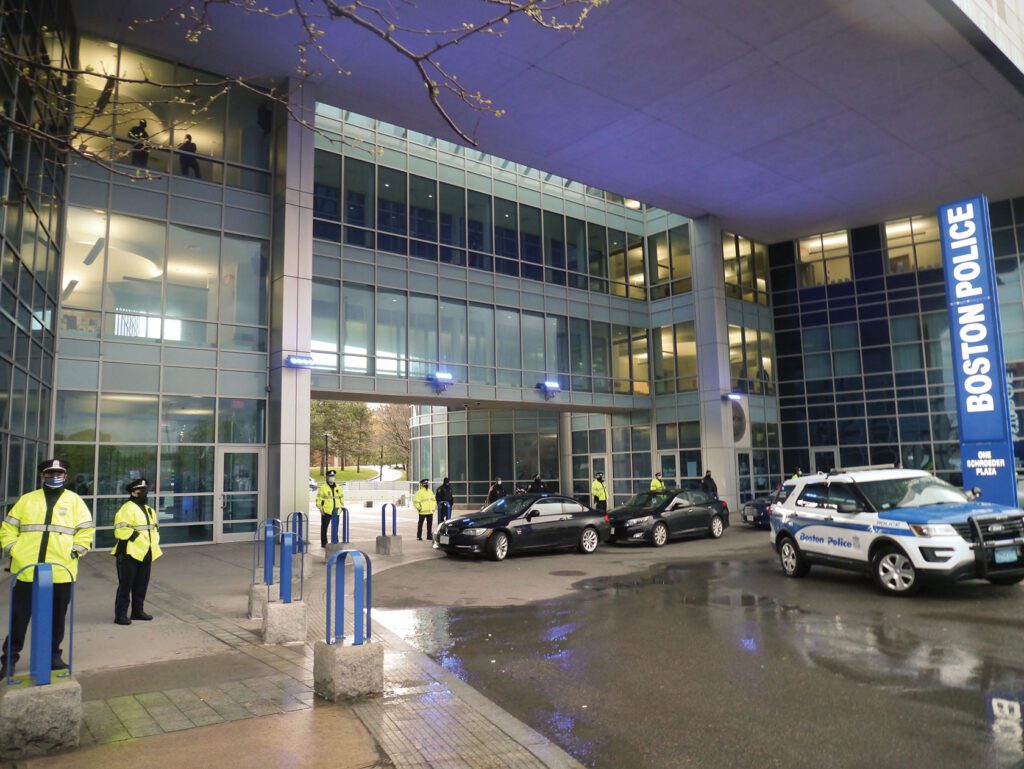
Attorney General Andrea Campbell’s May announcement that her office is investigating allegations of bias in the Boston Police Department’s gang unit was the latest in a series of challenges to the way officers police Black and Latino teens in the city.
Campbell’s office said its investigation would review the work of the Youth Violence Strike Force from 2018 through the present with an eye toward reform. Youth activists, criminal justice reform advocates and elected officials including Mayor Michelle Wu and many city councilors have advocated shutting down the controversial unit’s database of alleged gang members.
“It’s a violation of people’s privacy and it targets young Black men,” said Anne Rousseau, co-chair of the group JP Progressives. “We think it’s just bad police practice.”
Formed in 1993, the Youth Violence Strike Force and its list of alleged gang members have long generated controversy in the city’s Black community. According to the department’s Rule 335, three or more people who frequent an area or location who individually or collectively participate in criminal activity can be considered a gang.
Officers use a 10-point scoring system to assess gang affiliation. For example, a person can be given two points for each time they are observed having contact with a gang member. Other factors that can land people on the gang list include being assaulted by people the police consider gang members (three points) or information from a “reliable, confidential informant” (five points). Six points earns a person a “gang affiliate” label. After 10 points a person is considered a gang member.
Individuals who appear in the department’s gang database are frequently subjected to higher levels of police surveillance, are stopped by police more frequently and, if arrested, can be subject to more severe sentences.
Black teens have long complained that they have been harassed by members of the gang unit, and that they have been added to the list in error.
“We have a history of kids being profiled without the documentation necessary to justify why they’re being labeled gang members or added to the list,” said Abrigal Forrester, executive director of the Center for Teen Empowerment.
One teen who police added to the list, claiming he was a member of the MS-13 gang, Cristian Josue Diaz Ortiz, sued the department after the federal Department of Immigration and Customs Enforcement used his alleged gang affiliation to justify detaining him in 2018.
A federal appeals court last year sided with Diaz Ortiz, delivering the Boston Police Department a stinging rebuke, ruling that ICE officials “provided no other evidence to substantiate the inferences and conclusions drawn from the police reports.”
Police cited Diaz Ortiz’s enrollment at East Boston High School, which they say a number of MS-13 members attend and the fact that he was observed in East Boston parks where they claim MS-13 members are known to gather.
The Diaz Ortiz case touched off greater scrutiny of the gang unit. The ACLU of Massachusetts and other civil rights groups last year sued the department in an attempt to make public information about the database. ACLU of Massachusetts Executive Director Carol Rose says she’s in favor of abolishing the database.
“As the First Circuit held last year, the Boston Police gang database is flawed and shouldn’t be relied on to make consequential decisions about people’s lives,” she said in a statement sent to the Banner. “The database overwhelmingly targets Black and Hispanic young people, who have been labeled as gang members for little more than wearing popular brands or even becoming a victim of gang violence. That’s why, for the last five years, the ACLU and community activists have been urging the City of Boston to abolish its gang database.”
Among those calling for more sweeping changes to the department is District 6 City Councilor Kendra Lara, who worked with teenagers in the city’s Street Worker program. She says she supports shutting down the Youth Violence Strike Force and other special units within the department.
“One of the things we’ve seen across the country is that these types of specialized units are found to be overly aggressive and mostly ineffective at preventing crime,” she said. “When you ask Black and brown people about the gang unit, their stories are overwhelmingly stories of aggression and abuse.”
In recent years, cities including Memphis, New York and Atlanta have disbanded special units amid allegations of excessive use of force, beatings and extra-judicial killings.
Carl Williams, an assistant clinical professor of law at Cornell University, said dismantling the gang unit might not go far enough.
“In Boston, the raison d’être of the police is to go after young Black and brown people in low-income communities,” he said. “If we got rid of the gang unit, they will find another way to do that.”
Forrester, too, said the abuses of the gang unit call for a more fundamental change in policing.
“We could investigate the entire department,” he said. “Young people feel like they’re being disrespected by the entire department, not just one unit.”
Williams supports diverting funding from the police department into programs that prevent youth violence, such as job programs and housing and mental health services — measures that Lara and other councilors supported during the first round of budget negotiations.
“As a city, we have to be intentional about how we spend money and make sure we’re investing in things that are effective in preventing violence,” Lara told the Banner. “We need to be investing in things such as increased programming and supports for youths.”







